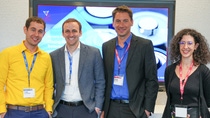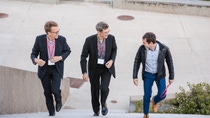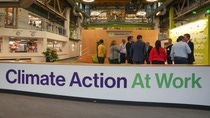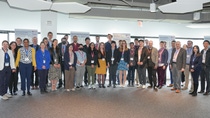Media
NORA: Bridging the gap between disruptive innovation and industrial scalability
For the past 10+ years, the North America Open Research Alliance (NORA) has been connecting BASF with some of the brightest and most innovative minds in academia and business across the United States through meaningful and successful partnerships.

NORA connects BASF to different areas of knowledge and innovation in the academic and entrepreneurial ecosystem across the U.S.
It all began in 2007 with the Advanced Research Initiative, a collaboration with Harvard University, to strengthen the bond between BASF and academia in North America. Since then, this partnership has grown into a more extensive research network known today as the North America Open Research Alliance (NORA).
NORA brings together researchers from some of the highest-impact universities in the country with experts and technology developers from BASF to advance disruptive and incremental solutions, creating chemistry to address the challenges of today and tomorrow.
Between 2012, when the University of Massachusetts (UMass) Amherst and the Massachusetts Institute of Technology (MIT) joined the network, and 2022, NORA initiated more than 100 research projects on a wide variety of subjects, including 3D printing, micro- and nanostructures, microplastics and biodegradation, smart interfaces, new formulation concepts and digitalization. These projects were executed together with 47 different faculty members and more than 100 postdoctoral and Ph.D. students, which has led to 46 patent applications and 35 publications in scientific journals.
The network expanded even further this year to include universities from Texas, Michigan, and North Carolina –moving closer to BASF’s U.S. operating footprint, R&D sites and customers served in the region.
From academia to business: the partnership between NORA and Greentown Labs
BASF’s purpose is to create chemistry for a sustainable future. In pursuit of this goal, NORA has driven relationships beyond academia at higher technology readiness levels (TRLs), e.g., with entrepreneurs who spin startups out of academia.
BASF Venture Capital (BVC) is a solid and straightforward partner bridging BASF to the startup ecosystem. Together with BVC, NORA has developed a successful collaboration with Greentown Labs, the largest climate-tech start-up incubator in North America – with over 500 companies incubated and more than 4 billion dollars in funding raised since its inception.
“Working with academic partners to drive sustainability in innovation within the Boston ecosystem in 2017, it seemed a necessary step to expand this approach to include startups. Beyond individual one-on-one relationships, Greentown Labs offered the unique opportunity to join a community centered around that goal.”
BASF engages regularly with startups in the Greentown Labs network and has participated in several different initiatives and accelerator programs, together with key innovation partners and customers such as Magna.
As Nour Ghadanfar, Senior Director of Partnership Programs at Greentown Labs, explains, "Since 2017, BASF has approached innovation with Greentown from a uniquely holistic approach. Whether it's helping to fund and launch Greentown Boston's wet lab, earnestly engaging with startups through their Terawatt partnership, taking up desks at Greentown to interact daily with the ecosystem, leading multiple Greentown Go accelerator programs, or joining the Carbontech Leadership Council as part of the Carbon to Value Initiative, BASF has embodied a truly committed and engaged partner. We can't wait to see what fantastic innovation will continue to be unlocked between our member startups and BASF in the coming years."
In 2023, BASF joined the Carbon to Value (C2V) initiative, now in its third cohort, with the goal of driving Net Zero technologies to scale, creating a collaboration network between carbon tech startups and industry leaders from different sectors. The cohort and BASF are currently holding discussions to determine the next steps on topics ranging from off-take agreements and on-site technology demonstration to joint development of unique carbon-to-value solutions.
Having recently expanded his role to lead the Collaboration & Scouting team for North America, Thomas Holcombe, Head of NORA, is optimistic about the future: “Now, more than ever, the role of partnerships in advancing science is decisive. As we embrace our many collaborators in the entrepreneurially spirited North American ecosystem of talented scientists and technology developers, I am confident that the interaction of BASF’s global network with the regional resources will create sustainable chemistry for years to come.”

From left to right: Thomas Holcombe, Michael Burdick, Business Manager of Battery Recycling Materials at BASF, Ryan Melsert, CEO of ABTC, and Nour Ghadanfar, Senior Director of Partnership Programs at Greentown Labs.
ABTC and BASF: a battery recycling match made in Greentown
Electric vehicles (EVs) are becoming popular in the United States, especially in recent years, supported in part by the Inflation Reduction Act. However, the batteries EVs require are made from metals such as lithium, nickel, cobalt, and manganese, all of which are increasingly scarce and primarily imported from abroad, posing supply chain and geopolitical risks.
Batteries are a complex system with a finite lifespan, but that is not the case for the elemental metals themselves.
As the only cathode active materials (CAM) producer for lithium-ion batteries with capacity in all three CAM-producing regions, and one of the largest NCx (lithium nickel cobalt oxides with either manganese or aluminum) producers globally, BASF has successfully created a closed-loop battery recycling system in China, using the metals from spent batteries to create new ones that are just as effective but produce lower emissions.
BASF has also announced its recycling capacity in Europe, but North America had not yet announced any developments on this front. The collaboration with the American Battery Technology Company (ABTC) became an instrumental part of the efforts in the region.
As part of BASF’s partnership with Greentown Labs, the Circularity Challenge was launched together with Stanley Black & Decker. The challenge promoted a six-month accelerator program aimed at developing creative solutions with startups covering plastics, batteries, and digital innovation to enable a circular economy.
After a highly competitive and months-long application, deliberation, and selection process, Greentown Labs announced the finalists in September 2019; one of the winning startups was ABTC, an integrated battery materials company that offers “sustainable sourcing of critical battery materials through lithium-ion battery recycling and primary battery metal extraction technologies.”
For the past three years, the combined expertise of ABTC and BASF has brought them much closer to achieving the first integrated closed loop in battery recycling in North America. The partnership between BASF, ABTC, TODA Advanced Materials, and Nanotech Energy was recently announced, effectively turning this long-time dream of a closed-loop lithium-ion battery recycling system in North America into a reality, as of 2024.
“The establishment of a true closed-loop battery materials supply chain within North America is only possible with the commitment of partners within each sector of the circular supply chain, and we could have no better partner in this endeavor than BASF."
Closing this loop means reusing the metals contained in the batteries, giving them new life, while also reducing the CO2 impact of batteries by at least 25% compared to the batteries produced from the metals extracted from mines.
The materials recovered by ABTC from used batteries will then be used by TODA to produce the precursor cathode active materials, which will then be used by BASF to produce the cathode active materials and send them over to Nanotech to create its battery cells.
It is a groundbreaking moment for battery recycling in the U.S. and BASF is proud to spearhead it.
Published on September 19, 2023 by Mariana Licio.
For media inquiries or to repurpose this article, please contact Lisa Brown.





